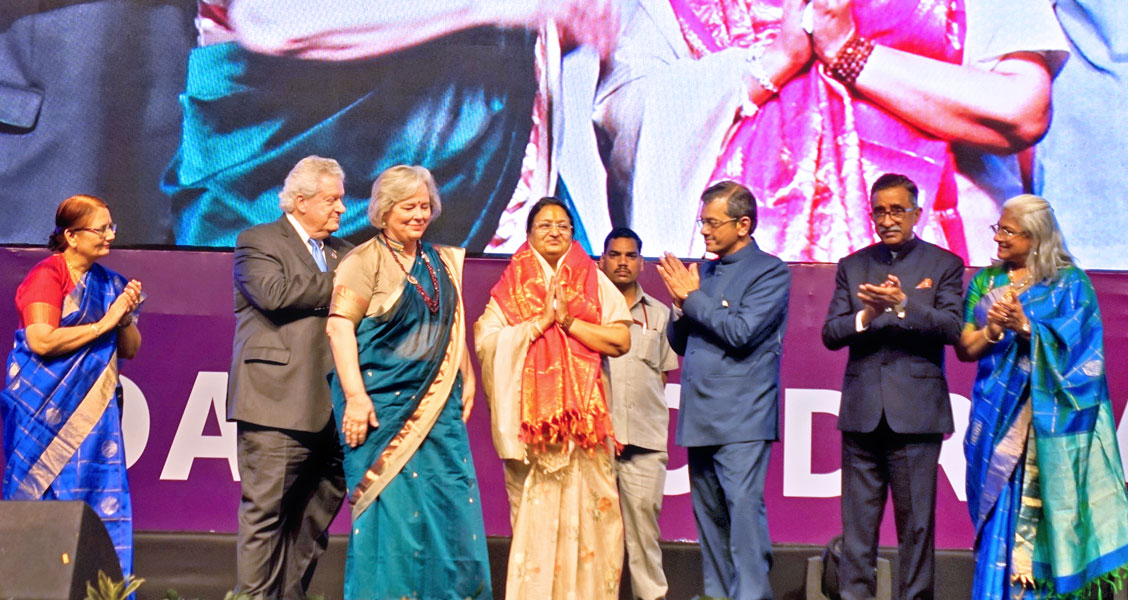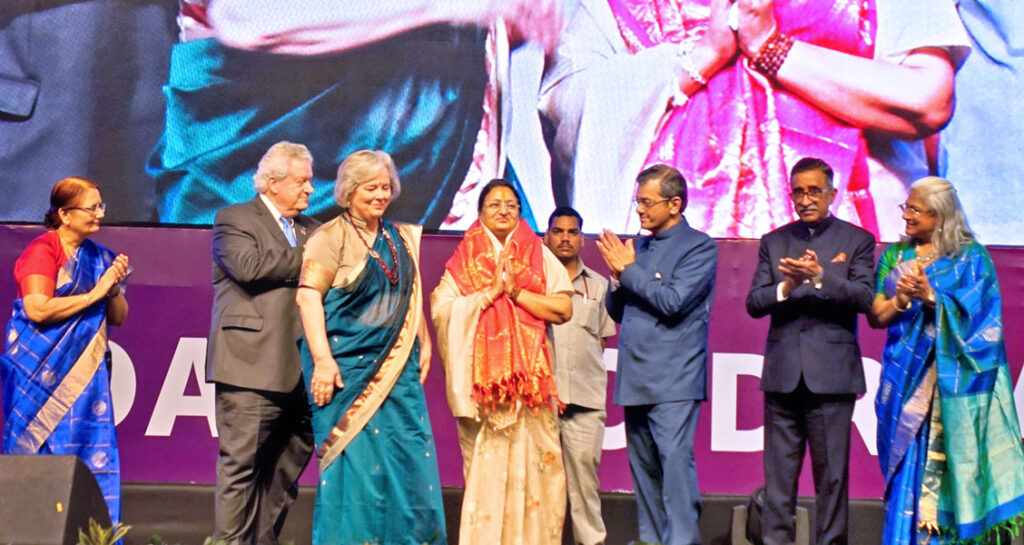
Underlining the importance of king-size dreams and explaining the message behind the Indore Institute’s theme ‘Dare to dream’, RI Director Bharat Pandya said that over 100 years ago, just when “Rotary was taking its baby steps”, an Indian entrepreneur, Jamsetji Tata put in his tender to supply steel rails to the British rail company. Its director made the scathing remark that if an Indian manages to make rails to British specifications, “I will eat every pound of steel if he is able to deliver. I do not know whether he ate all that steel, but not only did the Tatas supply steel to British rail, in World War II, the British tanks were called Tatanagars because the steel used to make those tanks came from Tatanagar, India!”
In 1964, when Muhammad Ali fought Sonny Liston in the world heavyweight championship, Liston was the king and Ali was an underdog. But Ali knocked him down in the sixth round, “proving the adage that it is not the size of the man in the fight that really matters, but the size of the fight in the man. Whether it was Tata or G D Birla, Ambani or Narayana Murthy, these are people who dared, dreamed and achieved,” Pandya said.
Similarly, in Rotary too, Paul Harris on Feb 23, 1905, thought of a world fellowship of likeminded individuals, people of integrity, united by the ideal of service and thus the Rotary journey began. As the journey progressed others joined and together, Rotarians dreamt big and achieved big.
“I too have a dream, to work for Rotary and with Rotarians, to make our communities and our world a little better. My dream tells me to make the most of this opportunity given to me. I consider the RI Director’s role not as a position of power but responsibility and my dream tells me to do my best in this important responsibility, to work for membership and TRF and to take Rotary forward.” While doing so, his focus would always be partnerships because together “we can achieve much more than when we work alone and because that will make our work more impactful. My dream also tells me to focus on integrity at all levels.” Quoting from India’s ancient texts he said: “The only thing that walks back from the tomb along with the mourners and refuses to be buried is a man’s character… it outlives the person and can never be buried.”
But to achieve big, Rotarians would have to think differently. Striking an introspective note, Pandya said the perfect world should be one where there is understanding, goodwill and peace. “But look at the world we live in, open your newspapers or TV sets… war, terrorism, corruption, starvation, rape and other images of darkness fill up media space. And in the midst of all this darkness we wonder whether the work we do for Rotary — a big project there, a small one here, can it really make any difference.”
But, as Confucius said, it is better to light a candle than to curse darkness. “That is the opportunity and responsibility that Rotary places on us… to light a candle of service. But one candle is not enough, we need hundreds and thousands of candles if we are to make the world a better place.” This is where RI President Mark Maloney’s call to “grow Rotary” assumed significance.

Pandya disclosed that in 2007, as the DG of RID 3140, he and Madhavi “were fortunate to have Mark Maloney and Gay attend our district conference as the then RI President Bill Boyd’s representatives. And today, as your RID, we are extremely happy to welcome him as the RI President and Gay, here in Indore.”
Urging Rotarians to take inspiration from pioneers such as Verghese Kurien who had revolutionised milk production in India, after a taunt by a British milk expert that the sewerage water of London was bacteriologically superior to the milk of Bombay. Today Amul is not only a household word but India is the largest milk producing country in the world. Pandya said that when one dreams, takes up challenges and has “an unwavering belief in oneself, that is the stuff of miracles.” Just like Neil Armstrong had taken the first step on the moon, so also Paul Harris had started Rotary as a small organisation. “But look at where Rotary is today — 214 countries, 1.2 million Rotarians doing the work of Rotary service day after day.”
Similarly, Jonathan Livingston Seagull was also a story about and for Rotarians, as it revealed that only the gull who flies the highest sees the farthest; “those who dream and dare, win. But Rotarians require additional important qualities, such as love and compassion. Compassion is not sympathy but empathy for the needy, underprivileged, which allows us to work to make our world a more equal place. Do service with love, kindness and compassion, because this is the language that the deaf can hear and the blind can see.”

Pandya added: “The miracle of our lives is not to fly or walk on water but to walk well in this world and make it special.” In our zones Rotarians were doing some amazing work… supplying school benches to hundreds of schools, conducting polio rallies, camps for medical ailments, giving handicapped dignity; critical medical services such as paediatric cardiac surgery, blood, eye and skin banks and life-saving equipment to hospitals, building toilets, putting up hand washing stations and making villages ODF. This was possible because 150,000 Rotarians were working with commitment, competence and compassion
Continuity and working together in harmony were the essence of such success. Madhavi and he had an excellent relationship with RI Director Kamal and Sonal Sanghvi, and TRF Trustee Gulam Vahanvaty. In 2018–19, our zones had contributed $21 million to TRF, with two RI Districts — 3190 and 3141 — emerging the top two districts in the whole world. For this, the hard work done by the 2018–19 governors and the “excellent leadership” provided by PRID C Basker were responsible.
He recalled how as a young medical student his father, a senior doctor with 40 years’ experience, had told him that he had prescribed all kinds of medicines, “but the one which works the best for patients is compassion. I asked him: ‘Dad, what if that doesn’t work?’ He replied: ‘In that case, double the dose!’ Yes, compassion is the key to dealing with not only patients but every human being.”
Working with youth had always been important to him, the RI Director said; “whether it is interacting with Rotaractors or chartering 23 Interact clubs in a single day, installing a 26-year-old president of an under-30s Rotary club, or chartering a next-gen couples club for people between 25–35. And for the first time we have Rotaractors (DRRs) at an Institute,” Pandya said, thanking PDG Ashish Ajmera for his help in getting them.
Institute Chair T N Subramanian said everybody had wondered why the Institute was held in Indore. “Why Indore, so many people asked me,” he said at the inaugural. But, when RID Pandya had given him the theme “dare to dream”, the more he thought about it, the more Indore, which had been topping the charts for the last few years as the cleanest city in India, had suggested itself.
A few years ago, Indore was among the dirtiest cities, but the sheer resolve shown by a single woman (Mayor Malini Gaur who addressed the inaugural session) who dared to dream about a clean city “and worked for it, walking around the streets at midnight, inducing in the citizens a sense of pride in the cleanliness of their city, brought about a massive change. These are the kind of dreams we need to have in Rotary… just like our dream of eradicating polio.”
Pictures by Rasheeda Bhagat
She has made cleanliness her mission
The Institute honoured the woman behind Indore emerging the cleanest city in India for three years in a row — Malini Gaur, the Mayor of Indore.
Addressing the meet, she recalled how in 2014, Indore was near the bottom of the cleanliness chart and the burning of waste was continuously producing harmful gases and its greenery was being depleted substantially.
With the cooperation of “all the elected representatives and people of Indore without whom I could have achieved nothing,” she took on the challenge of transforming the city.
Saying “apne liye jiye toh kya jiye (what’s the point in living just for oneself alone)”, she added that when she became an MLA — she is still one — she wanted to do something for her city, and her country and this dream was realised when she first became Mayor. “When the Prime Minister announced the Swacch Bharat Abhiyan, we made swachchata our mission and I am so grateful for the way the Indore people supported me. Some tough decisions had to be taken, but today there is so much awareness on the need for cleanliness.”
Recalling her journey, the Mayor said she began with one smart ward and “when we succeeded with that, we implemented the exercise in all the 85 wards in Indore.” The funds that the city got under the swachchata mission, were invested for vehicles and equipment for garbage collection and processing. “We segregated solid from liquid waste, providing two different boxes.” While from liquid waste organic fertiliser is manufactured, solid waste is also segregated and used for making roads, plastic pipes, etc.
Malini added that the city has a big vegetable market, “which generates a lot of vegetable waste. We have put up a `7 crore-plant to make methane gas from vegetable waste and 15 to 20 of our city buses are getting their fuel from it.”
Doctors have gone on record that thanks to this initiative — Indore has got the cleanest city award for three years, the incidence of diarrhoea, malaria and asthma has come down. “Aur ab hum chokka lagane ja rahey hei (we are expecting to score a fourth win this year!)”
RB







